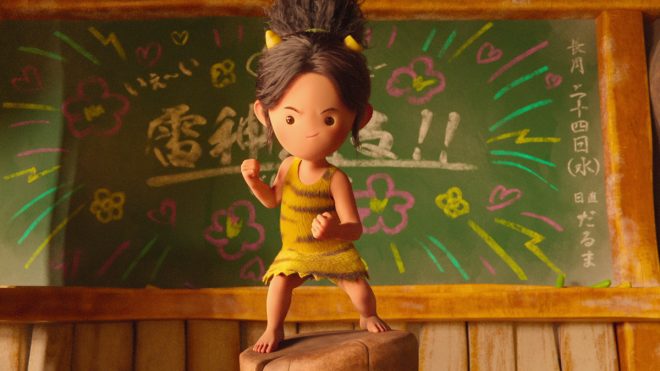By: Izumi Hasegawa November 10, 2022

Daisuke “Dice” Tsutsumi, whose short animation The Dam Keeper (2014) was nominated for an Academy Award and attracted attention as a promising animator, whose latest work is the Netflix mini-series Oni: Thunder God’s Tale, which is inspired by Japanese folktales. Cultural characters familiar to Japanese people, such as Kappa, Tengu, Namahage, Thunder God, and Wind God appear in the series.
 The main character, Onari, trains with her classmates under the guidance of Tengu-sensei to awaken her own “kushi”. “Kushi” refers to the mysterious power that resides in the “Kushimitama” (a soul that has mysterious power) that appears in “Shingo”, one of the traditional poems which are sung during Shinto ceremonies. In the beginning, Onari says, “We are the Kami, the great spirits of the natural world.” This is precisely the worldview the Japanese have passed down since ancient times, called Shinto. The Japanese recognized the mystical power in nature and natural phenomena, respected them as gods/deities and expressed respect and gratitude to them. In Shinto, humans were also believed to be born with part of the power of the gods, who become gods 50 years after their death. I’m impressed by writer’s ability to express that whole worldview in one sentence. Of course, Netflix also offers many multilingual audio and subtitle options. In the Japanese subtitles, it was localized as “I am Kami, the great soul that rules over Mother Earth.” I was impressed with their clever writing, which hinted at the true identity of “Naridon,” later revealed in the second episode.
The main character, Onari, trains with her classmates under the guidance of Tengu-sensei to awaken her own “kushi”. “Kushi” refers to the mysterious power that resides in the “Kushimitama” (a soul that has mysterious power) that appears in “Shingo”, one of the traditional poems which are sung during Shinto ceremonies. In the beginning, Onari says, “We are the Kami, the great spirits of the natural world.” This is precisely the worldview the Japanese have passed down since ancient times, called Shinto. The Japanese recognized the mystical power in nature and natural phenomena, respected them as gods/deities and expressed respect and gratitude to them. In Shinto, humans were also believed to be born with part of the power of the gods, who become gods 50 years after their death. I’m impressed by writer’s ability to express that whole worldview in one sentence. Of course, Netflix also offers many multilingual audio and subtitle options. In the Japanese subtitles, it was localized as “I am Kami, the great soul that rules over Mother Earth.” I was impressed with their clever writing, which hinted at the true identity of “Naridon,” later revealed in the second episode.

The residents of the Mount Kamigami besides Onari have a rounded, fluffy, cotton-like texture, resulting in extremely cute character designs. Their movements and reactions felt very Japanese. The atmosphere and music of the forest made me feel like I was watching an anime by Hayao Miyazaki.
In addition to the beautiful depiction of nature, I was moved by the music which held so much emotion. The soundtrack completes the visuals and has the power to drive emotions. It is almost as if the music is one of the characters in the story. The music incorporates Japanese instruments to create a Japanese ambiance while at the same time masterfully merging them with Western instruments.
In the English language version, Tengu-sensei is voiced by George Takei. Takei’s voice is low-pitched, fit for a serious tone, but in this series, there are comical scenes that take advantage of that seriousness, and you can enjoy discovering a new layer of Takei’s talent.

The voice actors for the main cast are mostly of Japanese descent, including Takei. For this work, many Japanese terms and names, such as “Bento” and “Wasshoi” appear in the English version, and I am glad those words will be pronounced correctly. That is not all. Just as I was lamenting how I had not seen any Japanese people join hands with their peers and/or juniors from their home country to reach new heights after being nominated for film awards and gaining attention, such as people from Mexico or Korea, Director Tsutsumi took action. This was a sort of double celebration.
 Calvin, a foreigner familiar with Japanese yōkai (monster) and folklore, appears in the second half of the series. I grew up in Shimane, the hometown of Japanese mythology, and have worked as a priest at the Shinto Shrine of Shusse Inari in America. Because of this, I have experienced meeting many non-Japanese people who are very knowledgeable on topics concerning Japanese culture and folklore. Seeing that depicted so beautifully warmed my heart. I hope that this work will be the catalyst to help more Japanese people themselves turn their attention to their own traditional culture.
Calvin, a foreigner familiar with Japanese yōkai (monster) and folklore, appears in the second half of the series. I grew up in Shimane, the hometown of Japanese mythology, and have worked as a priest at the Shinto Shrine of Shusse Inari in America. Because of this, I have experienced meeting many non-Japanese people who are very knowledgeable on topics concerning Japanese culture and folklore. Seeing that depicted so beautifully warmed my heart. I hope that this work will be the catalyst to help more Japanese people themselves turn their attention to their own traditional culture.
Through this series, the fear of strangers, of people who are different from oneself, and the fear people create on their own are depicted. Whether you fight against the fear or work to understand it and find a way to coexist is up to you. For people living in foreign countries, I believe it is something they have been forced to experience many times like I have myself.

Oni: Thunder God’s Tale
Onari is a tomboyish girl who lives on the Mount Kamigami with her gentle father, Naridon. In preparation for the upcoming demon moon, under the guidance of Tengu-sensei, she desperately tries to awaken her “Kushi”, but she has trouble doing so. In the midst of this, Naridon’s true identity is revealed, but Onari doesn’t have much time to take it in before she learns a shocking truth about her own identity.
Translated by Hana Umemoto /Hollywood News Wire Inc.
